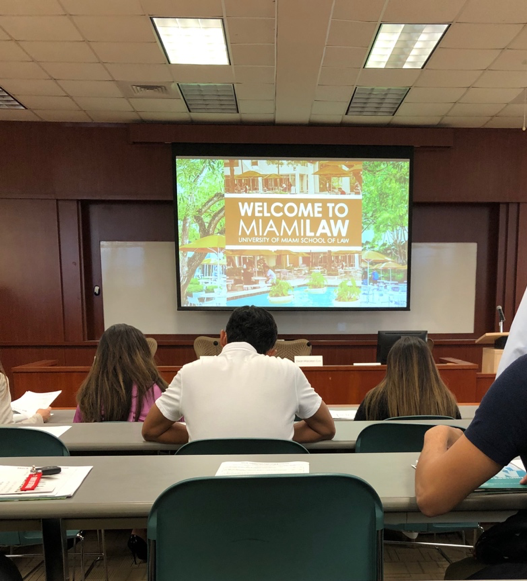
The results are in: 203 of 246 first-time test takers from the University of Miami (UM) School of Law passed the Florida bar exam administered in late July, raising the university’s overall pass rate to 82.5% — the second highest percentage in the state.
The news came on Monday, Sept. 20 after the Florida Board of Bar Examiners released the test results for Florida’s 11 law schools. Of the 3,343 people who sat for the exam across the state, 1,483 — or 44.4% — passed, 72% of which were taking the exam for the first time. Florida International University led the state rankings with a 88.8% passing rate for first time test-takers, followed closely by UM and the University of Florida.
“We are extremely proud of our Miami Law graduates and their recent success in bar examination passage rates and we are excited about the future of our School of Law and new cohort of first year law students who joined the University this fall,” Executive Vice President for Academic Affairs and Provost, Jeffrey Duerk, said.
Miami Law witnessed a 10% point increase compared with the October 2020 passing rate of 72.5% and a 20% point increase compared with the February 2021 passing rate of 62.1% — an accomplishment highly attributed to the School of Law’s efforts to provide students with opportunities for academic and professional development through programs like the Academic Achievement Program (AAP).
The AAP coordinates a variety of initiatives to prepare students for the Florida Bar Exam, including Bar Week, Bar Boot Camp and Bar Coaching. Bar Boot Camp provides students with specialized weekly workshops that train them to think critically and Bar Coaching gives all Miami Law graduates the opportunity to receive one-on-one study guidance from a “bar coach.”

Rodney Rawls, associate director of the AAP and a lecturer at Miami law, discussed the program’s goal to help UM’s law students excel during and after law school, noting that he is proud of all the new alumni for their perseverance through the personal and academic challenges caused by the coronavirus pandemic and virtual learning restrictions.
“I know a lot of people see numbers, but I see stories and I see people,” Rawls said, discussing the impressive efforts of the Miami law graduates who took the July Florida Bar exam.
Brian Sites, another associate director of the AAP and Miami law lecturer, elaborated on the university’s efforts to help students pass the Bar through alumni mentorship programs and individualized counseling, emphasizing his view on the importance of cultivating a culture of care among the student body at UM law.
“One of the most effective things that a school can do to promote bar passage is to have that culture of collective support for each other, pushing everybody to the finish line,” Sites said.
While the increased Florida Bar passage rate is undoubtedly an accomplishment for the university, the news comes just two months after UM President Julio Frenk abruptly fired law school Dean Anthony Varona, publicly claiming that the law school needed “a dean with the required vision and effectiveness of execution to bring the school to new levels of excellence.”
In his time as dean, Varona worked to ease the difficulty of transitioning to virtual learning as a result of COVID-19 and achieved significant gains for the School of Law’s US News rankings performance. By significantly increasing staffing and resources for the AAP, Varona shifted Miami Law’s focus to bar-exam preparation, which is seemingly reflected in the updated Florida rankings.
Other changes effected during Varona’s tenure that may have contributed to the school’s improved ranking include the hiring of a new head of bar success from the University of Florida, the implementation of new admissions and curricular requirements aimed at boosting bar results and a shift in focus toward a more individualized approach to bar coaching, according to professors within Miami Law.
After his firing as dean, Varona agreed to continue teaching at Miami law as a tenured professor before Julio Frenk released a statement naming him dean emeritus of the law school on Aug. 20.
Although the reason for Varona’s firing is still unknown, UM law continues to improve the quality of its education by expanding programs such as the AAP and creating new initiatives for the collective growth of its community.
“The School of Law will continue to do its utmost to prepare our students for future success as they involve themselves in rewarding careers that benefit society and tackle some of the pressing issues facing the world today,” Duerk said.






